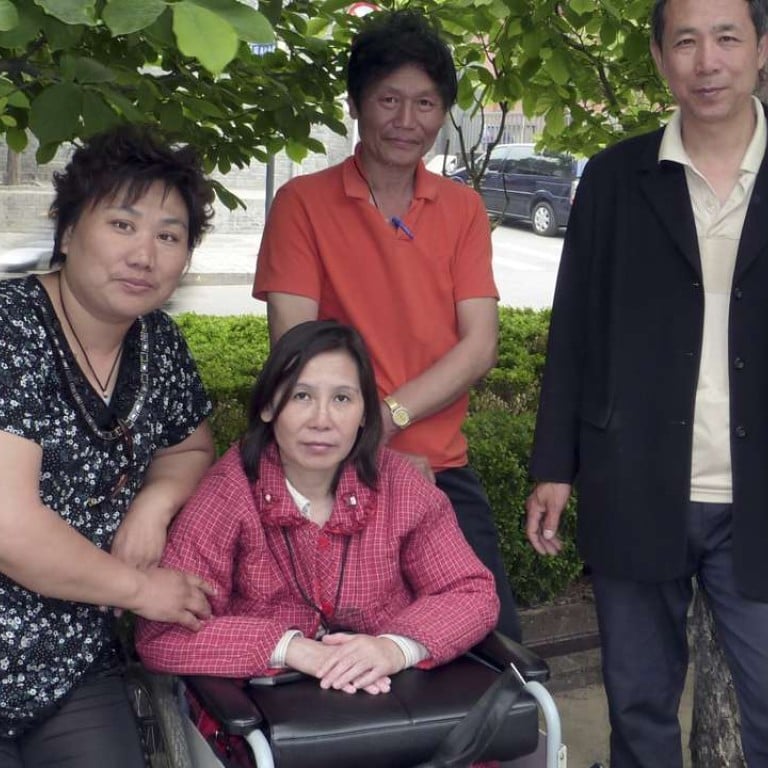
Activists in China pay a heavy price for fighting everyday injustices
Jerome A. Cohen says the story of rights activist Ni Yulan illustrates not only the cruelty of the party-state’s repression, but also the resilience of those who advocate for change
Statistics summarise the Chinese Communist Party’s increasingly appalling repression of its country’s human rights lawyers and activists, and daily media reports record their criminal detentions, televised “confessions” and unfair trials. We learn less of the informal punishments inflicted on this gallant group and their families – kidnapping, torture, threats against children, loss of employment, denial of housing and application of psychiatric drugs. Yet only knowledge of these individual, low-visibility punishments gives us a full picture of the party-state’s continuing cruelty and mockery of its oft-voiced commitment to the “rule of law”.
Lawyers for rights activists in China increasingly persecuted, report says
One of the saddest stories of Chinese human rights advocates concerns Ni Yulan (倪玉蘭). She, her husband Dong Jiqin (董继勤) and their daughter were ordinary Beijing residents living in a traditional courtyard home. Disaster struck when, in 2001, China was awarded the 2008 Summer Olympic Games. The government immediately began large-scale “urban renewal” projects and their house, along with the rest of the neighbourhood, was condemned.
Only knowledge of these low-visibility punishments gives us a full picture of the party-state’s cruelty
Ni, who learned about law through her employment, threw herself into advocacy against the impending demolition, soon helping others slated for eviction and also neighbours in trouble for different reasons. A strong, confident woman, she soon gathered a following who depended on her advice.
But there is no effective legal recourse against urban evictions in China. Those who, like Ni and Dong, try to resist, are sometimes bought off. Often, holdouts encounter threats and violence.
One day in 2002, Ni was taken to a police station and tortured. When she returned from the station, she had lost the use of her legs. Yet she refused to give in, continuing her advocacy in a wheelchair. In retaliation for her persistence, she was tried and sentenced to prison. While in prison, her home was demolished. When Ni was released, police were unwilling to let the couple rent a place in their old area, so they camped in a park, in a tent donated by friends, and were watched round the clock by police.
Watch: He Yang’s documentary, Emergency Shelter
Their situation drew the attention of a public-minded videographer, He Yang, whose 2010 award-winning documentary about the case, Emergency Shelter, briefly made Ni a widely known figure. She became a magnet for Beijing’s many petitioners in need of moral support and advice.
The authorities finally relented and let the couple move to a “hostel”. It was there that I visited her in December 2010 and heard her story.
Ni’s story shows the complexity of the party-state’s relations with its citizens, especially those who dare to complain about government abuses
But in April 2011, the authorities detained the couple again, in the wake of a larger crackdown on rights defenders. Both she and her husband were convicted of a vague public order crime, and went to prison again. After they came out, they were monitored. Wherever the couple settled, within a short time, police would instruct their landlord to terminate their contract and evict them.
Most recently, on April 15, thugs dragged them out of their current abode, beat them and even took away their personal belongings and ID cards. With characteristic spirit, the couple insisted on reporting the incident to the police, and refused to leave the local station until the police registered their complaint. Obtaining no satisfaction, they began to sleep in the station’s reception area in protest.
This story testifies to the remarkable stubborn resilience of rights-conscious people fighting the system’s ordinary, everyday injustices. Ni’s and Dong’s nightmare evictions are undoubtedly similar to that of thousands of others; and we know that many millions of Chinese citizens have experienced displacement due to urban or infrastructure projects.
Forced evictions are destroying society in China, and elsewhere
This story also shows the complexity of the party-state’s relations with its citizens, especially those who dare to complain about government abuses. The police do not want to register the couple’s complaint since this might result in an investigation exposing their responsibility for the thugs’ misconduct. Yet they have not thrown the couple out of their station , presumably because they fear further public criticism. It is an ironic twist that, in this case, the police have become the besieged – at least for the moment.
Jerome A. Cohen, adjunct senior fellow at the Council on Foreign Relations, is professor of law at NYU and faculty director of its US-Asia Law Institute

